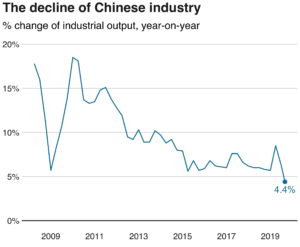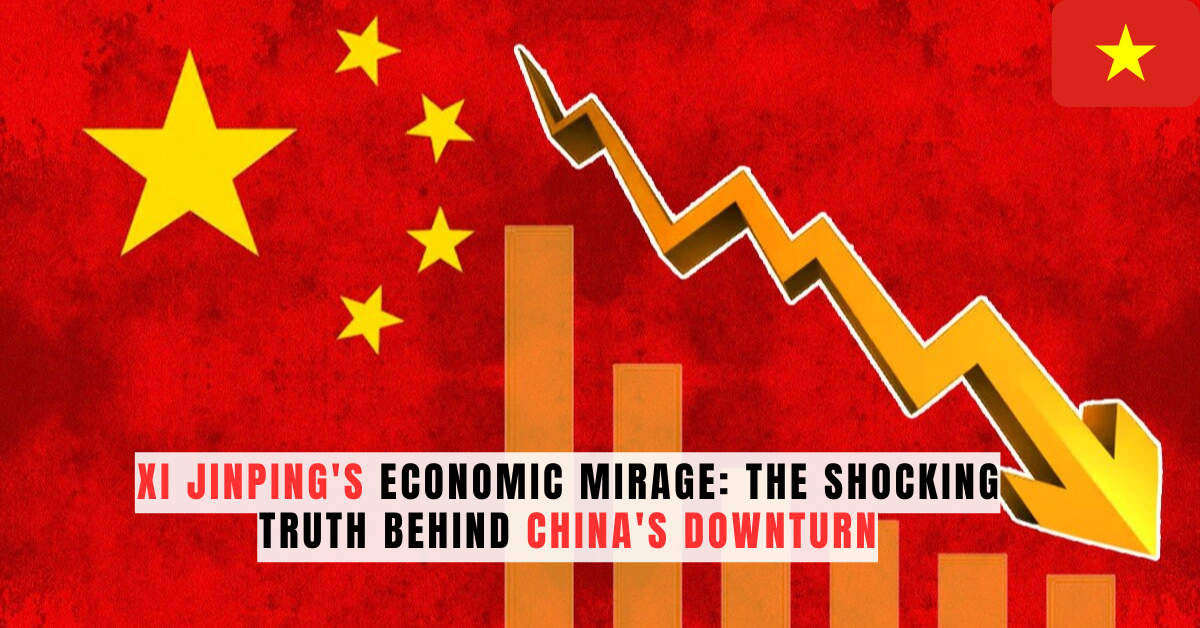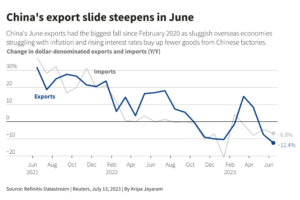In recent years, Chinese President Xi Jinping has been a vocal advocate for the robustness of the Chinese economy, often boasting about its unprecedented growth and resilience. However, recent developments suggest that Xi can no longer confidently brag about the state of the Chinese economy.
Contents
Economic Slowdown Signals Alarm
The Growth Trajectory Stumbles
Xi’s once-flaunted economic achievements are facing headwinds as China experiences a notable economic slowdown. The Wall Street Journal reports that the growth trajectory, which was once soaring, has encountered unexpected obstacles. This slowdown has prompted economic analysts to reconsider their optimistic projections for China’s economic future.
Trade Tensions Take a Toll
One significant factor contributing to this economic deceleration is the escalating trade tensions between China and the United States. The protracted trade dispute has led to decreased exports, impacting various sectors of the Chinese economy. This downturn challenges Xi’s narrative of an unstoppable economic powerhouse.

Real Estate Woes: A Bubble Bursting?
Property Market Pains
Another critical aspect undermining Xi’s economic narrative is the turmoil in China’s real estate market. Previously viewed as a pillar of strength, the property market is now exhibiting signs of vulnerability. Reports from economic experts suggest that the bubble might be on the verge of bursting, posing a severe threat to the stability of China’s financial landscape.
“The challenges facing China’s economy require a careful reassessment of our strategies to ensure sustainable growth.” – Xi
Government Interventions
In an attempt to avert a full-blown crisis, the Chinese government has implemented measures to stabilize the real estate market. However, these interventions may not be sufficient to offset the underlying issues, and the effectiveness of such measures remains uncertain.
Debt Dilemma: Balancing Act Turns Precarious
Mounting Debt Levels
China’s escalating debt levels have become a cause for concern, challenging Xi’s narrative of prudent economic management. As the nation strives to maintain its economic momentum, it has accumulated substantial debt. The burden of this debt may prove to be a stumbling block, hindering the sustainable growth that Xi has consistently promoted.
Risks of Overleverage
Economists argue that China’s overreliance on debt to fuel economic expansion carries inherent risks. The potential consequences of this overleverage include financial instability and a heightened vulnerability to external economic shocks.
| Key Challenges | China’s Response |
|---|---|
| Economic Slowdown | Trade dispute impact, reevaluation |
| Real Estate Woes | Government interventions |
| Debt Dilemma | Balancing act adjustments |
| Global Headwinds | Pandemic adaptation, policy shifts |
Global Headwinds: Pandemic Fallout and Beyond
Pandemic’s Lingering Impact
The global economic fallout from the COVID-19 pandemic has also left an indelible mark on China’s economic landscape. While the nation initially showcased resilience in overcoming the pandemic’s immediate challenges, the lingering effects are now manifesting in the form of disrupted supply chains and weakened consumer demand.
Evolving Global Dynamics
Moreover, evolving global dynamics, including geopolitical shifts and the emergence of new economic powerhouses, pose additional challenges to China’s economic supremacy. Xi’s narrative of unassailable economic dominance is now met with skepticism as these global headwinds intensify.
China is headed for slower, healthier economic growth, says Leland Miller, CEO of @ChinaBeigeBook at the Bloomberg #NewEconomyForum pic.twitter.com/zmZ4rQPS9c
— Bloomberg New Economy (@BBGNewEconomy) November 19, 2021
Facing Reality
In conclusion, the once-unassailable narrative of China’s economic invincibility, championed by President Xi Jinping, is encountering formidable challenges. The economic slowdown, real estate market uncertainties, mounting debt levels, and global headwinds collectively paint a more nuanced picture of China’s economic landscape.
As China grapples with these challenges, it becomes evident that Xi’s ability to boast about the Chinese economy is no longer as justified as it once was. The need for strategic interventions and a recalibration of economic policies is apparent if China is to navigate through these turbulent times and regain its economic footing.

